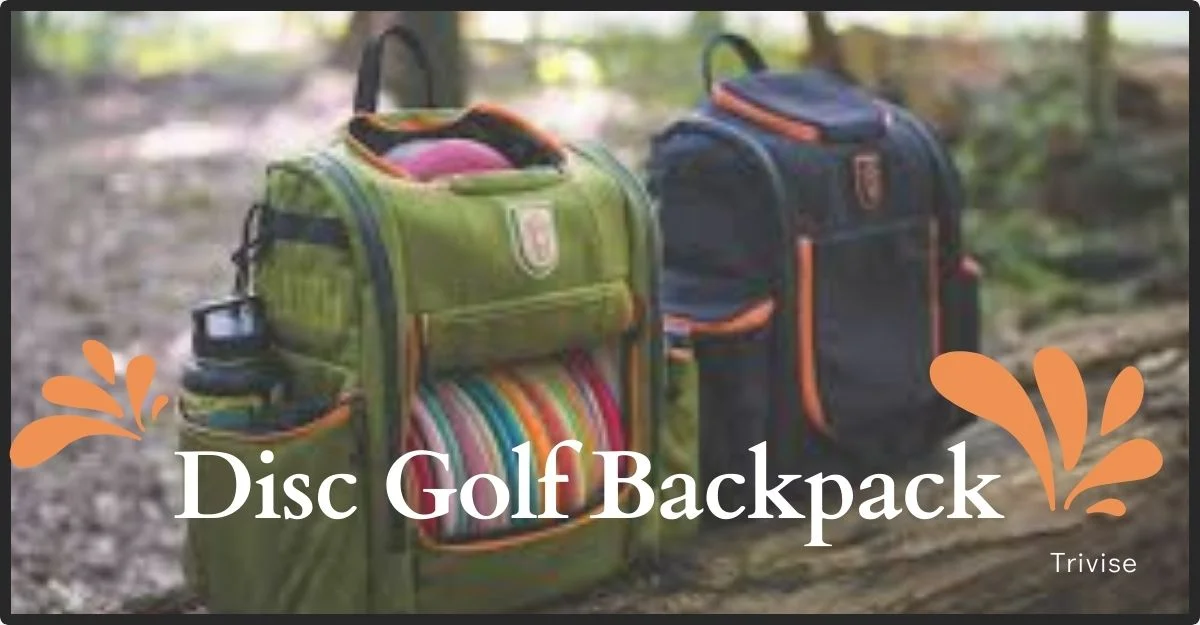Disc golf has become an increasingly popular sport, celebrated for its accessibility, outdoor enjoyment, and exciting gameplay. As players advance, they accumulate more gear—especially discs suited for different throws and conditions. A well-designed disc golf backpack becomes essential, helping players carry multiple discs, accessories, and essentials comfortably on the course. Whether you’re a beginner or a seasoned player, selecting the right disc golf backpack can make a huge difference in your game experience.
This guide explores everything you need to know about disc golf backpacks, including types, features to consider, top brands, and tips for selecting the perfect backpack. By the end, you’ll be ready to find the right backpack that not only suits your style but enhances your game performance.
1. Why Choose a Disc Golf Backpack?
A disc golf backpack is more than just a storage solution; it’s an essential piece of equipment that can improve your game experience and make your time on the course more enjoyable. Here’s why investing in a good disc golf backpack is worthwhile:
- Organization: With multiple compartments and pockets, disc golf backpacks keep your discs organized and easy to access. This saves you time searching for the right disc and allows you to stay focused.
- Comfort: Designed for long walks on the coed, disc golf backpacks are built with comfort in mind, featuring padded shoulder straps, ergonomic back panels, and even lumbar support.
- Durability: Quality disc golf backpacks are made from rugged materials that withstand the elements and rough terrain.
- Extra Storage: Many backpacks come with additional compartments for items like water bottles, snacks, towels, and personal items, making it easier to stay prepared for a long day on the course.
2. Types of Disc Golf Backpacks
There is a variety of disc golf backpacks to choose from, each designed to meet different needs. Here’s a breakdown of the main types to help you find the perfect fit for your playing style.
a. Beginner Backpacks
- Overview: Designed for new players, beginner backpacks are simple, lightweight, and typically hold around 8-12 discs.
- Best for: Players who are just starting out and have a limited disc collection.
- Features: These bags often include a basic main compartment, one or two side pockets, and sometimes a water bottle holder.
b. Intermediate Backpacks
- Overview: Offering more space and additional features, intermediate backpacks can usually hold between 15-20 discs.
- Best for: Casual to intermediate players who play regularly and need more storage capacity.
- Features: Intermediate bags typically have a padded back panel, adjustable shoulder straps, and extra compartments for personal items and accessories.
c. Professional-Level Backpacks
- Overview: Professional-grade disc golf backpacks are built for high-capacity, often holding over 20 discs along with plenty of extra gear.
- Best for: Serious players, tournament participants, and those who play long rounds or in varying weather conditions.
- Features: High-end materials, durable construction, insulated pockets, multiple compartments, reinforced stitching, and comfortable back support.
d. Cart-Compatible Backpacks
- Overview: These backpacks are designed to fit on a disc golf cart, giving players the option to carry or roll their bags.
- Best for: Players who prefer to pull their gear instead of carrying it, especially on longer or more challenging courses.
- Features: These bags tend to have high-capacity storage and additional compartments for convenience when mounted on a cart.
3. Key Features to Look for in a Disc Golf Backpack
When choosing a disc golf backpack, certain features make a huge difference in terms of comfort, durability, and functionality. Here’s a breakdown of what to consider:
a. Capacity
- Capacity is one of the most important factors. Beginner bags might hold 8-12 discs, while advanced bags can hold over 20. Determine how many discs you usually bring to the course, and choose a bag that offers room for your collection with some room to grow.
b. Comfort
- Comfort is essential for long rounds, especially if you’re carrying a heavy load. Look for padded shoulder straps, a well-ventilated back panel, and even a chest or waist strap for added stability.
- Back Support: Ergonomic designs that mold to your back’s shape help distribute weight evenly and reduce strain.
c. Insulated Compartments
- Many advanced disc golf backpacks come with insulated compartments to keep drinks and snacks cool throughout the game. This is especially beneficial for players in warmer climates or those who like to play long rounds.
d. Durability
- Choose a backpack made from high-quality, weather-resistant materials like nylon or polyester. Reinforced stitching and durable zippers can extend the life of your bag, especially if you play in rugged environments.
e. Extra Storage
- Extra compartments are helpful for carrying items like towels, markers, scorecards, valuables, and accessories. Look for bags with easy-access side pockets, hidden compartments for valuables, and water bottle holders.
f. Rain Cover
- If you frequently play in wet weather, consider a bag that includes a built-in rain cover or is compatible with one. This feature helps protect your discs and gear from getting soaked.
4. Top Brands for Disc Golf Backpacks
There are several reputable brands in the disc golf community that provide high-quality, durable backpacks for every skill level. Here’s a look at some top brands worth considering:
a. Dynamic Discs
- Dynamic Discs offers a range of backpacks, from beginner models to advanced, tournament-grade options. Known for quality and comfort, they’re a top choice among many players.
b. Innova
- Innova’s backpacks are versatile and well-constructed, with options for beginners and advanced players alike. Their Adventure and Super HeroPack models are especially popular.
c. Prodigy Disc
- Prodigy is celebrated for innovative designs and durable materials. The Prodigy BP series offers everything from beginner-friendly models to professional-level backpacks with ample storage and comfort features.
d. Grip Equipment
- Grip Equipment is a premium brand known for its high-quality, ergonomic designs. Their bags are durable, comfortable, and perfect for serious players who prioritize comfort and storage.
e. Latitude 64
- Latitude 64 bags are stylish, practical, and built to last. They have options like the Core Bag for casual players and the E3 Luxury Backpack for advanced players who need more space and durability.
5. Tips for Choosing the Right Disc Golf Backpack
Here are some tips to help you choose the best disc golf backpack based on your unique needs:
a. Consider Your Playing Frequency
- If you play frequently, investing in a high-quality backpack with durable materials and ample storage is a wise choice. Casual players may be comfortable with a more basic, budget-friendly option.
b. Think About Your Disc Collection
- The size of your disc collection will help determine your backpack’s capacity needs. If you’re just starting out, a smaller backpack might suffice. If you have a large collection, look for a high-capacity bag with organized compartments.
c. Evaluate Your Comfort Needs
- Comfort is key, especially for long rounds. Choose a bag with padded shoulder straps, a ventilated back panel, and adjustable straps that suit your body type.
d. Look for Specialized Features
- Insulated compartments, rain covers, and extra pockets add value to your bag and make your experience on the course more enjoyable.
e. Set a Budget
- Disc golf backpacks range from budget-friendly options for beginners to high-end, professional-grade models. Set a budget that aligns with your needs and desired features.
6. Maintenance Tips for Your Disc Golf Backpack
Proper care and maintenance can extend the life of your disc golf backpack. Here’s how to keep your bag in great shape:
- Clean Regularly: Wipe down your bag after each game to remove dirt and debris. For a deeper clean, use a mild soap and water solution and let the bag air dry.
- Avoid Overloading: Avoid carrying more discs or gear than your bag is designed for to prevent wear and tear.
- Store Properly: When not in use, store your bag in a cool, dry place away from direct sunlight to avoid material degradation.
Conclusion
A well-chosen disc golf backpack can make a huge difference in your experience on the course. Whether you’re a beginner just starting out or an experienced player with a large disc collection, there’s a backpack that suits your needs. By considering the features discussed here—such as capacity, comfort, durability, and extra compartments—you can find a bag that enhances your game and makes every round more enjoyable. Invest in a quality disc golf backpack, and you’ll be well-prepared to tackle any course with ease.
FAQs
1. How many discs should a beginner carry in a disc golf backpack?
- Beginners can start with a smaller backpack that holds around 8-12 discs, enough to cover basic throws and allow for a few backups.
2. Are there disc golf backpacks designed for specific weather conditions?
- Yes, many advanced backpacks come with water-resistant materials and insulated compartments for hot or rainy weather, allowing players to keep items dry or drinks cool.
3. Can I use a regular backpack instead of a disc golf backpack?
- While a regular backpack can work temporarily, disc golf backpacks are designed for easy access to discs, better weight distribution, and added comfort, which a standard backpack might lack.
4. What’s the advantage of a disc golf backpack with a rain cover?
- A rain cover helps protect your discs, valuables, and gear from getting wet during rainy games, ensuring your equipment stays in good condition.
5. What is the typical weight of a fully loaded disc golf backpack?
- The weight depends on the number of discs and items carried. A fully loaded backpack with 20 discs, water, and accessories can weigh between 10-15 pounds.
6. Are disc golf backpacks allowed in tournaments?
- Yes, disc golf backpacks are allowed in tournaments and are often the preferred option for players, as they provide easy organization and access to discs during competitive play.









